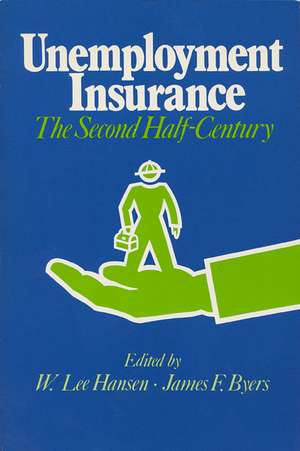Unemployment Insurance: La Follette Public Policy Series
Autor W. Lee Hansenen Limba Engleză Paperback – 14 feb 1990
Modeled after Wisconsin’s own unemployment compensation plan in the 1930s, federal unemployment insurance has long been considered one of the most important public policy achievements of the New Deal. Always paying benefits according to legislative and administrative guidelines and never requiring a taxpayer bailout, the program has nonetheless undergone strains induced by structural changes in both the economy and the prevailing political milieu. An outgrowth of a conference to celebrate the program’s fiftieth anniversary, the papers collected in this volume describe the history of the program, analyze the strains it has undergone and that it faces in the 1990s, delineate the source of current debates over unemployment compensation, and offer suggestions for the future of the program.
Preț: 212.78 lei
Nou
Puncte Express: 319
Preț estimativ în valută:
40.72€ • 44.37$ • 34.31£
40.72€ • 44.37$ • 34.31£
Carte tipărită la comandă
Livrare economică 23 aprilie-07 mai
Preluare comenzi: 021 569.72.76
Specificații
ISBN-13: 9780299123543
ISBN-10: 0299123545
Pagini: 504
Dimensiuni: 155 x 230 x 30 mm
Greutate: 0.68 kg
Ediția:New.
Editura: University of Wisconsin Press
Colecția University of Wisconsin Press
Seria La Follette Public Policy Series
ISBN-10: 0299123545
Pagini: 504
Dimensiuni: 155 x 230 x 30 mm
Greutate: 0.68 kg
Ediția:New.
Editura: University of Wisconsin Press
Colecția University of Wisconsin Press
Seria La Follette Public Policy Series
Notă biografică
W. Lee Hansen is professor emeritus of economics at the University of Wisconsin–Madison. His publications include, Academic Freedom on Trial and Education, Income, and Human Capital. James F. Byers is professor emeritus of industrial and labor relations at Indiana University of Pennsylvania.
Descriere
Modeled after Wisconsin’s own unemployment compensation plan in the 1930s, federal unemployment insurance has long been considered one of the most important public policy achievements of the New Deal. Always paying benefits according to legislative and administrative guidelines and never requiring a taxpayer bailout, the program has nonetheless undergone strains induced by structural changes in both the economy and the prevailing political milieu. An outgrowth of a conference to celebrate the program’s fiftieth anniversary, the papers collected in this volume describe the history of the program, analyze the strains it has undergone and that it faces in the 1990s, delineate the source of current debates over unemployment compensation, and offer suggestions for the future of the program.


